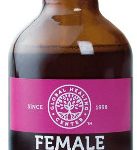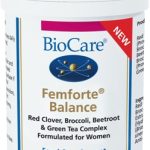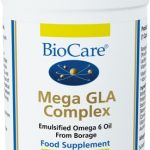Nowadays, there’s no shortage of so-called medical remedies for menopause, the time in a woman’s life (usually in middle age) when major physical change occurs in her body. Yet, this surely isn’t the way to look upon this experience – because the menopause isn’t something to be fixed medically; it’s something that’s entirely natural, although in many ways not something to savour. Still, it’s not a disease that’ll see the person suffer for the rest of their life; should it then be treated with pharmaceuticals and hormone therapies? Or rather with natural remedies – nutrients consumed through diet and/ or natural supplementation? Surely, the latter is the purer, more respectful way to treat your symptoms at this time of life?
Menopause is, of course, characterised by the ending of menstrual cycles and a combination of several physical symptoms (hot flashes/ flushes, reduced energy and low mood, even depression1), yet the reality is – to underline the fact it’s not a ‘physical’ illness – it’s a phase of a woman’s life that’s entirely deliberately induced by a gland in the brain; namely the hypothalamus, the major gland of the endocrine system.
And this gland (the chief controller of the body’s hormones) is called on to do so because, behind the scenes, menopause is all about ceasing the production of oestrogen and progesterone – that is, stopping a woman’s ability to have children. Thus, a woman will likely experience a feeling of imbalance both physically and emotionally, as their body’s inevitably seeking a new hormonal balance. And, like it or not, this hormonal change can actually occur in many women’s bodies before their menopause itself hits (perimenopause, as it’s known), therefore increasing the amount of hormone replacement therapy (HRT) conducted nowadays, for women experiencing both menopausal and perimenopausal symptoms. Yet, do you really want to rely on this sort of treatment; one that has a potential link to increasing the risk of developing heart disease2 and breast cancer3?
Menopause symptoms
Now, all that said, it’s true some women are lucky, for some suffer little discomfort. Others, though, seem to run the whole gamut and go through everything. There’s no guarantee then what any one single woman’s experience will turn out to be, but generally speaking, the following make for a good guide to the symptoms often experienced during menopause:
- Hot Flashes (or flushes) – perhaps the most common symptom of all, they tend to come and go, quite unexpectedly, rising from the chest region and can feel rather feverish; in extreme cases, when combined with uncomfortable sweating, they can also interfere with sleep patterns
- Unpredictable Periods – before menopause takes hold, it’s common for it to be preceded by periods that come and go with frustrating unpredictability; they tend to lighten and settle down as the change of life begins and then cease altogether
- Sexual experience – one of the most advised reasons to pursue natural treatment is to address these specific symptoms; women tend to find, owing to the vaginal mucous membranes becoming both drier and thinner (often causing itches and uncomfortable intercourse), their libido may reduce during the change in life, but afterwards they may find they actually enjoy lovemaking more and, again with aid of natural health support, many such sexual-related symptoms subside over time
- Putting on weight – unfortunately, yes, it’s true; the hormonal and metabolism changes wrought by menopause tend to be a perfect storm when it comes to weight gain4.
Natural menopause solutions
Controversial though it’s become (and for good reason; see above), HRT remains an enormously widespread treatment, but with menopause being a natural, necessary change in a woman’s life, it really must be best to let nature take its course as much as possible and reduce discomfort, pain and distress in as natural way as you can, mustn’t it? Taking tablets and so on to replace hormones your body is discarding (and discarding them quite naturally, at that) is hardly a natural approach – and as mentioned, unless something’s wrong, the body will seek to achieve homeostasis itself anyway.
To get through these – to a greater or lesser extent – temporary symptoms of menopause then, turning to natural remedies has to be the way forward. Increasingly, women are talking up the positive results they’re gleaning from homeopathy5, yet there’s surely no beating improving your nutrition in certain areas of your diet. Indeed, evidence exists to support Omega-3 fatty acids, in particular, easing the effects of hot flashes and mood changes7, 6, featuring as they do in everything as common as fish to nuts to seeds (and their oils). Meanwhile, you may also find specific herbs help alleviate the severity of certain symptoms; herbs such as black cohosh, ginseng, red clover, skullcap and wild yam.
Menopause supplements
Now, depending on the severity of your symptoms, you may like the idea of boosting your relevant nutrient intake (beyond doing so via diet, that is). In which case, natural supplementation can be another avenue to explore; one that, afterwards, many women find they’re pleased they have. In which case, the following three supplements are just a trio of such products available from us at The Finchley Clinic:
Female Fuzion – a harmonious, multi-herb-supercharged extract designed to assist the body in regulating proper hormone balance in order to restore vitality, energy, sexual desire and wellness during menopause.
Femforte Balance – a potent combination of botanical extracts to aid the balancing of oestrogen levels and detoxify potent oestrogens that may, in part, be causing illness, especially during menopause, perimenopause and outbreaks of endometriosis; features the ingredients red clover and (for their antioxidant qualities) broccoli and green tea and combines well with FemGuard.
Mega GLA Complex – comprises Gamma linolenic acid (GLA), an Omega-6 fatty acid that helps synthesise prostangladins (a hormone-like substance important for metabolic processes including menstrual cycle regulation).
References:
1. Casper R. F. ‘Clinical manifestations and diagnosis of menopause’. UpToDate.com. http://www.uptodate.com/contents/clinical-manifestations-and-diagnosis-of-menopause. Feb 2014.
2. Hou N., Hong S., Wang W., Olopade O. I., Dignam J. J. and Huo D. ‘Hormone Replacement Therapy and Breast Cancer: Heterogeneous Risks by Race, Weight, and Breast Density’. Journal of the National Cancer Institute. 2013. 105 (18): 1365-1372.
3. Lai J. N., Wu C. T., Chen P. C., Huang C. S., Chow S. N. and Wang J. D. ‘Increased risk for invasive breast cancer associated with hormonal therapy: a nation-wide random sample of 65,723 women followed from 1997 to 2008’. PLoS One. 2011; 6 (10): e25183.
4. Davis S. R., Castelo-Branco C., Chedraui P., Lumsden M. A., Nappi R. E., Shah D. and Villaseca P. ‘Understanding weight gain at menopause’. Climacteric. Oct 2012; 15 (5): 419-29.
5. Bordet M. F., Colas A., Marijnen P., Masson J. and Trichard M. ‘Treating hot flushes in menopausal women with homeopathic treatment–results of an observational study’. Homeopathy. Jan 2008; 97 (1): 10-5.
6. Freeman M. P., Hibbeln J. R., Silver M., Hirschberg A. M., Wang B., Yule A. M., Petrillo L. F., Pascuillo E., Economou N. I., Joffe H. and Cohen L. S. ‘Omega-3 fatty acids for major depressive disorder associated with the menopausal transition: a preliminary open trial’. Menopause. Mar 2011; 18 (3): 279-84.
7. Lucas M., Asselin G., Merette C., Poulin M. J. and Dodin S. ‘Ethyl-eicosapentaenoic acid for the treatment of psychological distress and depressive symptoms in middle-aged women: a double-blind, placebo-controlled, randomized clinical trial’. The American Journal of Clinical Nutrition. Feb 2009; 89 (2): 641-51.



